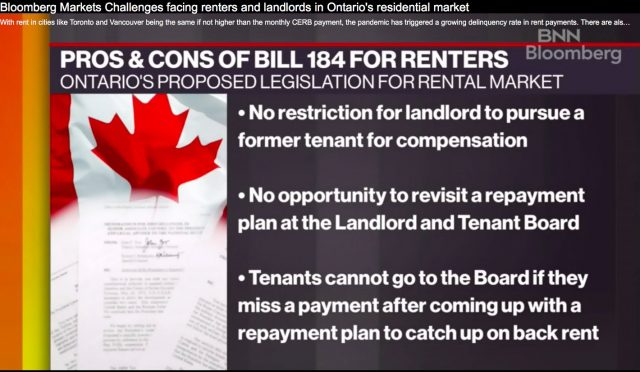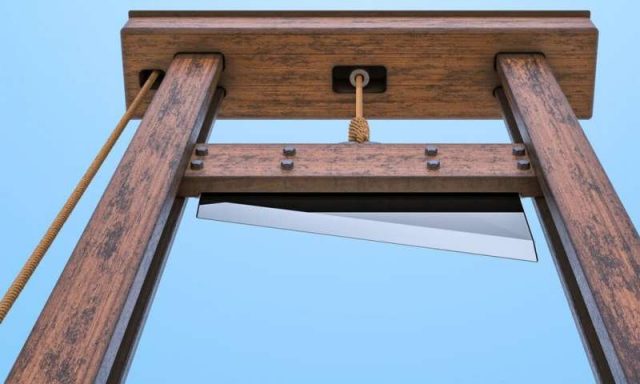Disclaimer: “This isn’t an attack on landlords. This is an attack on the system that got us here.”

“Let’s make a payment plan. Let’s avoid the LTB, work together (tenant signs)….GOT YOU… Hahaha I can now evict you fast, you have no legal rights now! SUCKER! The Sheriff is coming now to kick you out!”
Tenants need to be aware of the huge challenges we are soon going to face!
While the Premier has acted all kind and cuddly (like that fat drunk uncle we all see during the holidays who laughs as he passes gas and then beats your aunt to bloody pulp when they get home) it’s only an act.
The reality is those of us who rightfully didn’t pay rent (or full rent) are being prepared for the slaughterhouse (legally)!
It’s called Bill 184 and you can bet it will soon be the law and the slaughter of tenants will begin.

The government will not forgive tenants not paying and instead are going to demand tenants agree to “payment plans” that bypass the legal process of going to the Landlord and Tenant Board for a legal Hearing (where tenants have rights and free legal help)
The NDP came up with a plan to help tenants cover rent by using government funds to help during the horrible pandemic.
Even some landlord groups such as the Ontario Landlords Association proposed this as a way for tenants and their landlords to avoid conflict and avoid evictions.
Lots of other industries have received government support, so why not residential tenants and their landlords?
No, that would have been too easy and too nice. Why be nice when they want a slaughter and I think they enjoy seeing us suffer!
Suze Morrison is an NDP MPP who wants to protect tenants. Morrison is very aware of the reality and the coming avalanche of mass evictions based on landlords legally being able to trick tenants into forfeiting our legal rights.
Thousands of tenants in Ontario are lying awake at night, worrying about losing the roof over their head when the province’s weak pause on the enforcement of evictions ends.
They wouldn’t be this position if Doug Ford had answered the NDP’s call to provide a rent subsidy to tenants who have lost income or their job due to the COVID-19 pandemic, but here we are.
As if this wasn’t bad enough, the Ford government has found a way to make things even worse.
Now, in the middle of the pandemic, the Conservatives are attempting to quietly ram through legislation that will make it easier for landlords to evict tenants.
Don’t be fooled by the name of the legislation. Bill 184, the Protecting Tenants and Strengthening Community Housing Act, is bad for tenants.

Tenants already faced an uphill battle at the Landlord and Tenant Board, squaring off against often deep-pocketed landlords and their high-priced lawyers. If passed, Ford’s eviction bill will leave tenants with fewer defences to avail themselves of and fewer opportunities to plead their case.
Consider the case of a landlord who refuses to fix a malfunctioning radiator in a tenant’s unit. If the tenant withholds their rent, the landlord can haul them in front of the Landlord and Tenant Board.
Under Bill 184, the tenant may be prevented from pointing out other issues, like the landlord’s failure to maintain the unit in a good state of repair, at the hearing on non-payment of rent.
Bill 184 also takes away a tenant’s right to return to the Landlord and Tenant Board if they miss a payment after coming up with a repayment plan to catch up on back rent. This is especially concerning in the context of the pandemic.
Thousands of tenants in Ontario will be trying to catch up on back rent after losing their income or job. What if they feel pressured to accept a repayment plan and fall behind on payments despite their best efforts? What if their financial circumstances change because there’s a second wave of COVID-19?

Under Bill 184, there’s no opportunity to revisit the repayment plan at the Landlord and Tenant Board. Tenants could find a sheriff knocking on their door, ready to enforce their eviction, the second they miss a payment.
The Ford government can claim that its eviction bill is about “protecting tenants” all it wants. But even Steve Clark, the minister of Municipal Affairs and Housing, admits that the legislation is about moving things along at the Landlord and Tenant Board when the government switches the lights back on.
In this very paper, he wrote: “We know that when regular hearings resume at the LTB, there will be a backlog of cases requiring resolution. That’s why this legislation is important today — in light of COVID-19.”
Yes, there will be a backlog of cases. The enforcement of evictions may be on hold for now, but that hasn’t stopped landlords from threatening tenants with eviction — even for partial rent payments.
And what is the Ford government doing with thousands of evictions on the horizon in Ontario? Instead of helping tenants keep up with rent, and in turn ensuring landlords get paid, the government is greasing the gears of the Landlord and Tenant Board to speed up evictions.

Tenants deserve better than a government that claims it’s protecting them when it’s really making them more vulnerable to losing the roof over their heads.
It’s time for the Ford government to scrap its plan to make evictions easier and step up with rent relief to help see tenants through the economic pain of COVID-19.







